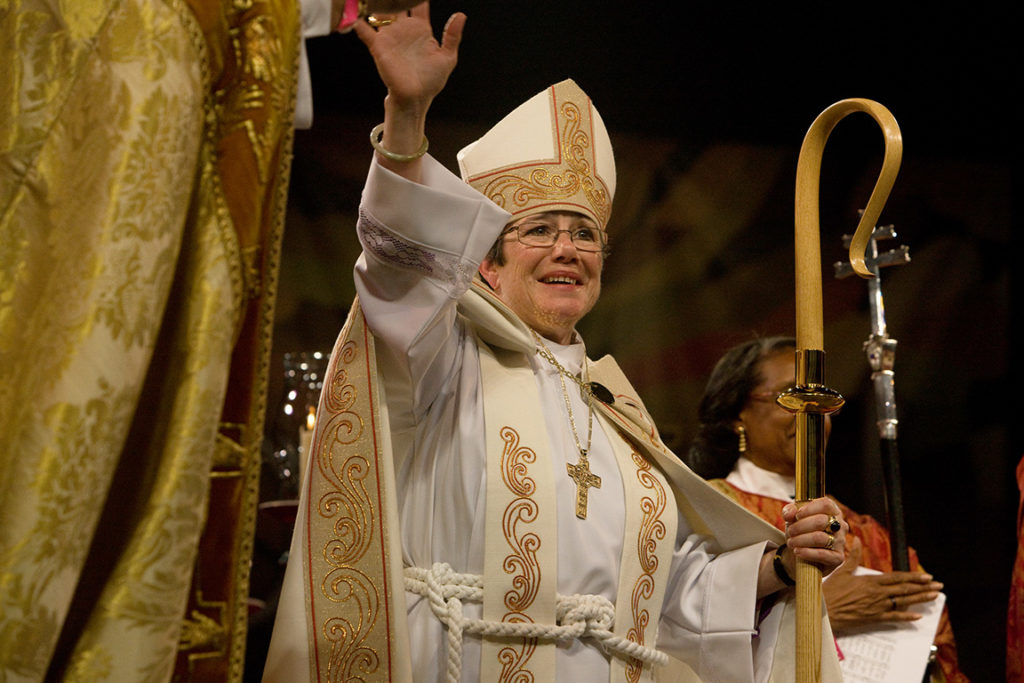
Bishop Diane M. Jardine Bruce waves to the congregation after her May 15, 2010 ordination and consecration as bishop suffragan of the Diocese of Los Angeles. Photo: Don Anderson
Diane Marie Jardine Bruce is a 4’11 bundle of unmatchable energy; Facebook posting early morning till late night with back-to-back meetings in-between, an “extreme extrovert” who parlayed a love of morning walks and a facility for languages into signature ministries. Ten years after becoming the Southland’s first woman bishop she remains, at heart, simply a pastor, shepherding and supporting her flock.
Much of her episcopacy — she was consecrated on May 15, 2010 at the Long Beach Convention Center — has involved simply saying yes, making connections and deepening relationships, Bruce told The Episcopal News recently.
“I am constantly learning from congregations, laity and clergy about how mission and ministry is being done, can be done, should be done,” she said. “The best ministry comes up from the people, not down from somebody’s bright idea from the top.
“These are people in the trenches doing this ministry day in and day out, seeing a need and coming to me and my being able to support them by being physically present or inviting others to be part of it.”
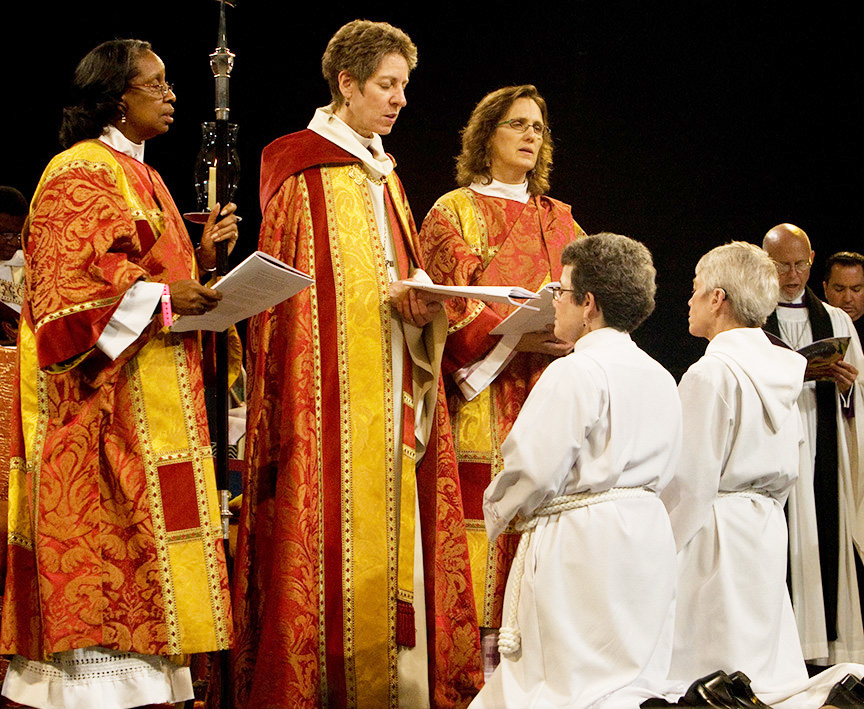
In a rare double consecration, Presiding Bishop Katharine Jefferts Schori ordains Diane M. Jardine Bruce and Mary Douglas Glasspool as bishops suffragan in the Diocese of Los Angeles. Bruce and Glasspool were elected on subsequent days at Diocesan Convention in December 2009. Glasspool served the dioceses until April 2016, when she was called as bishop assistant in the Diocese of New York. Flanking Jefferts Schori in the photo are Deacon Jamesetta Hammons and Deacon Kathryn Derose. Photo: Don Anderson
Since she became the 16th woman to serve in the Episcopal Church’s House of Bishops, she has made ground-breaking connections across cultures and borders, locally, nationally and internationally.
Diocesan Bishop John Harvey Taylor and the Rev. Melissa McCarthy, canon to the ordinary — among those who work most closely with Bruce — said her personality and sense of humor make her easily approachable.
“Diane is pastor when people need it, prophet when the world needs it, and a friend always,” Taylor told The Episcopal News via email. “Even when the going gets tough, she’s good-humored, upbeat, and pragmatic, always seeing a way forward through difficulty.”
McCarthy agreed. “Bishop Bruce is a tireless leader and pastor,” she said. “She is an excellent listener and a wise counselor. Her sense of humor and her down-to-earth nature make her so accessible. She is so well loved. It’s an absolute pleasure doing ministry with her.”
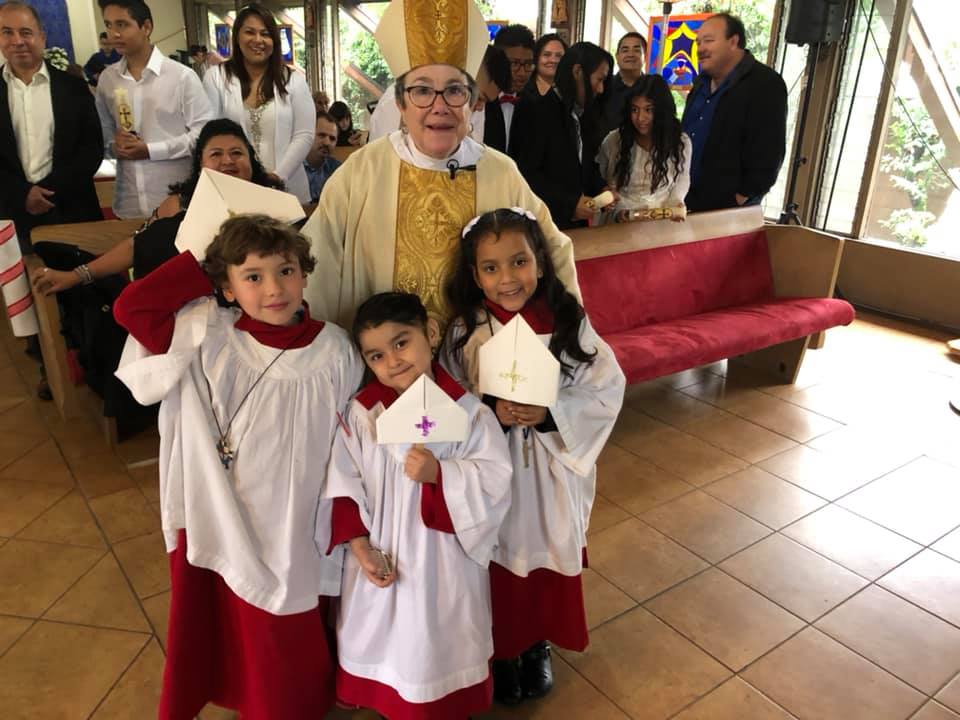
Bishop Bruce gathers with children during an episcopal visitation to Immanuel Church, El Monte, in 2019.
In Los Angeles: Stewardship is the way
Whenever Bruce celebrates the Eucharist — regardless of the demographic makeup of the congregation or gathering — she typically does so in Spanish, Mandarin, and English, with a little bit of Jersey thrown in at the exchange of the Peace.
“I want diocesan congregations to know that the word of God is being preached and celebrated in many languages every Sunday, and that that’s something we need to celebrate and hold up and honor and support,” Bruce told The News.
It’s just good stewardship, she says.
As local and national demographics have shifted, she has seized opportunities — with the assistance of lay and clergy leadership — to bolster such New Community ministries as the Instituto de Liderazgo Spanish language leadership program and the Li Tim-Oi Center for Chinese ministries. Located at the Church of Our Saviour in San Gabriel, the center was named for the Rev. Florence Li Tim-Oi, the first woman to be ordained to the priesthood throughout the Anglican Communion in 1944.
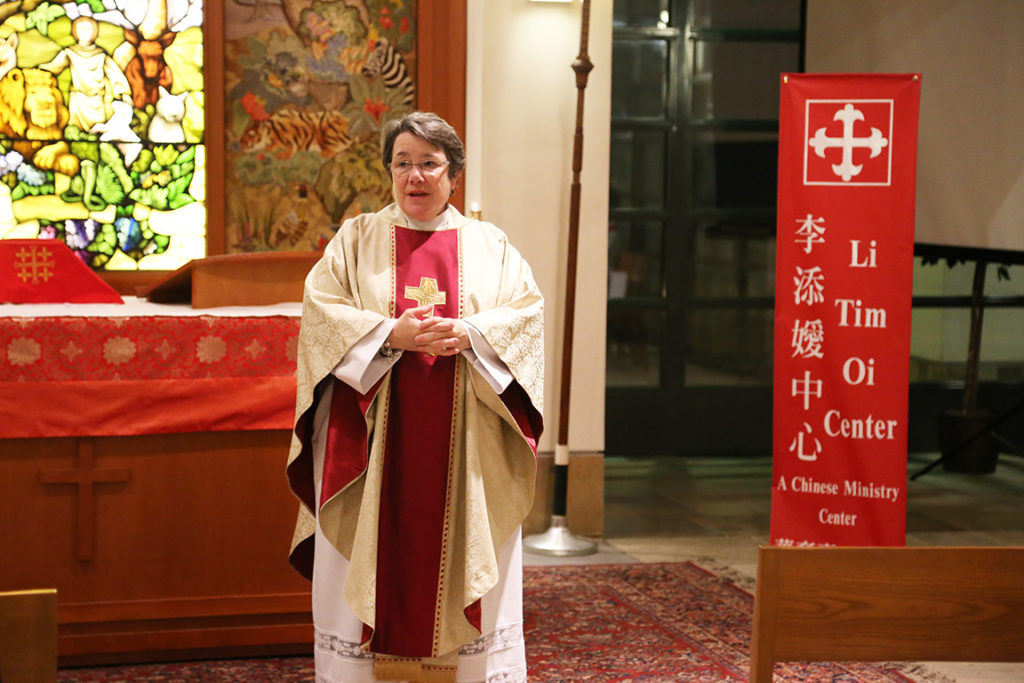
Bishop Bruce preaches at the 2014 opening Eucharist for the Li Tim Oi Center for Chinese ministries, housed at Church of Our Saviour, San Gabriel. Photo: Janet Kawamoto
“It is vitally important that we understand how to welcome and embrace members of the New Community and help them to embrace us,” Bruce said. “The Episcopal Church is really a perfect place for New Community ministry, much more than any other denomination, because, in the words of Presiding Bishop Michael B. Curry, in walking the way of love, we can meet people where they are, and learn and grow and be enriched by the gifts, talents and skills and way of being they bring to the table.”
Suzanne Edwards-Acton, chair of the diocesan Commission on Black Ministries, said working with Bruce has been generative. “She asks questions, is willing to say ‘I don’t know,’ seeks greater understanding and takes very seriously the charge to open pathways for the voices of communities of color to be sought out, raised up, included, empowered, and amplified; all with the intention of these voices becoming more broadly heard and influential within the diocese.”
Advocacy for New Community Ministry like The Gathering: A Space for Asian American Spirituality and the cultural immersion programs they host “has from day one been her real fire and passion,” says Steve Bruce, who has been married to Bishop Diane for 39 years. “It is an ongoing story in terms of pushing to have a track for that community so they can begin to take their places more and more among clergy of the diocese.”
Additionally, he noted, she initiated this whole concept of walkabouts — of joining congregations to walk in their communities and to engage their neighbors. “And it just grew. Every church wanted to engage in that. It really deepened her understanding of the people of the diocese.”

Bishop Bruce leads the first “Called to the Wall” pilgrimage during Holy Week in 2012. The annual trip from Los Angeles to San Diego concludes at the U.S.-Mexico border with a celebration of the Eucharist. It has continued each year since, except in 2020, when it was cancelled due to the COVID-19 pandemic. Photo: Chris Tumilty
She agreed. “It wasn’t just who you saw in your neighborhood,” she recalled, “but who you didn’t see. It also involved how the church was viewed by the neighborhood. We had a lot of conversations about, how do you make the church not look like it’s just a school? Or about cutting down trees so signs could be seen.”
The Rev. Scott Claassen, vicar of St. Michael’s University Church in Isla Vista, said Bruce’s “creativity is indefatigable, yet it belies an astute intellect and pragmatism. She makes us laugh and cry while also modeling financial acumen and walkabout clarity. I am a better priest and a better follower of Christ for her leadership and friendship.”
Bruce “is two steps ahead of everyone,” the Very Rev. Peter Browning, vicar of St. Andrew’s Church in Irvine and Deanery 10 dean, told The News. “Her vision of where the church is headed and how we need to get there is amazing.”
Deanery 10 is one of five deaneries Bruce oversees, including also Deaneries 1, 2, 8 and 9, which encompass Santa Barbara, Ventura and Orange counties and parts of Los Angeles county.
“Diane loves us all,” Browning said. “We all know that if we need help and we call Diane, she will find us. What has impacted me the most is that when I make that call she is going to tell me what I need to hear and not what I want to hear. We all know what that feels like and Diane has such a pastoral way of leading us down that journey. We are all so blessed to have her.”
The Rev. Kelli Grace Kurtz, rector of All Saints Church in Riverside, agreed. “‘We can do this’ has been a central message of her ministry: collaborative, inclusive, positive, generative,” she said of Bruce. “She pulls people into vibrant ministry. Her attentiveness to confirmands is something of the Holy Spirit: she channels what God is saying to the confirmand and has the courage to speak those words into the confirmand’s heart. Her ability to listen and speak is not just a linguistic marvel (and it is), but a gift of the Spirit that lowers mountains and straightens pathways.”
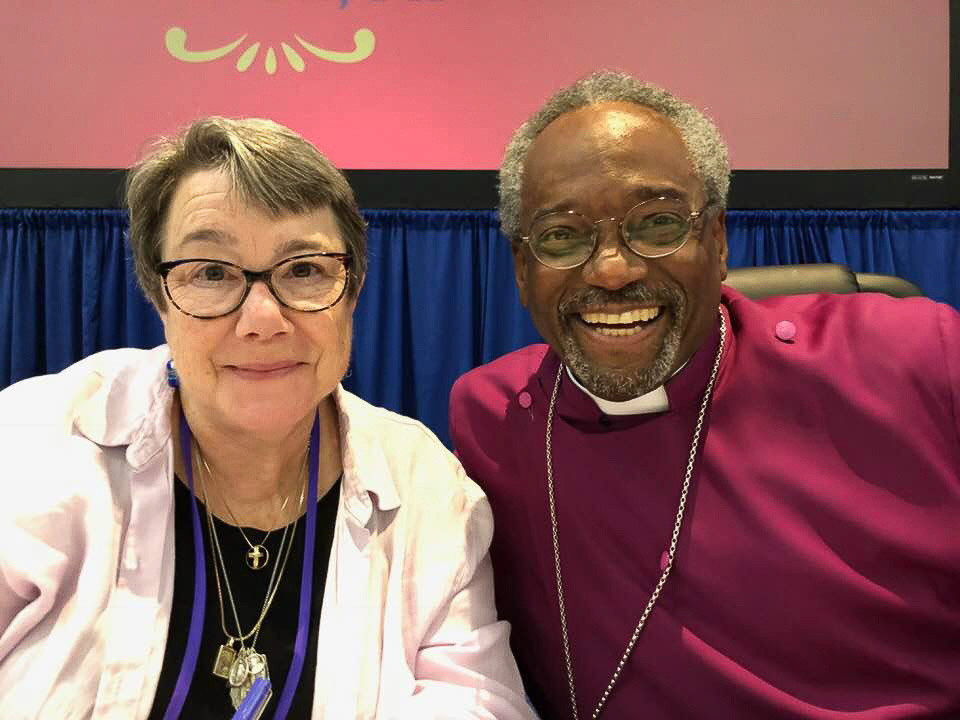
Bishop Bruce sits in her place next to Presiding Bishop Michael Curry during House of Bishops sessions at the 2018 General Convention in Austin, Texas. Bruce is secretary of the HoB, having already served as assistant secretary. Photo: John Taylor
Church-wide ministry
The former Wells Fargo banking executive’s financial acumen comes in handy as stewardship officer for the diocese and leader of the team that produces the annual narrative budget.
She has taken her financial know-how to the wider Episcopal Church as a member of the Church Pension Fund board of trustees. She was elected to that position by General Convention in 2012, according to Mary Kate Wold, fund chief executive officer and president.
“Diane’s spirit of inclusiveness, her connection to the Latino and Asian communities in the Episcopal Church and beyond, and her enviable language skills have been distinct assets in helping the Church Pension Fund connect effectively with our non-English speaking and non-domestic clients,” Wold said in an email to The Episcopal News.
Additionally, Bruce’s role as secretary to the House of Bishops has increased collaboration and communication between it and the Fund. “Equal to the impressive professional attributes that make Diane such an ideal trustee are her wonderful personal qualities. Her blend of intelligence, tenacity, unabashed humor, tell-it-like-it-is talk, passion, and warmth make her a trustee to whom everyone listens and trusts. We are grateful that Diane’s boundless energy enables her to add service as a Church Pension Fund trustee to the list of her numerous leadership responsibilities, and the entire Episcopal Church benefits from her dedication to our organization.”
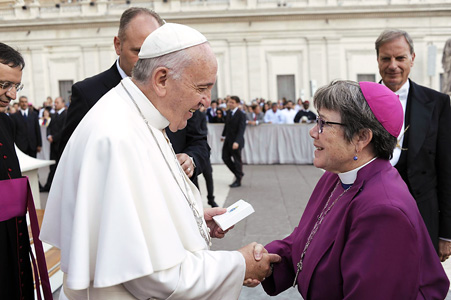
Bishop Bruce meets Pope Francis in Rome. The bishops suffragan of the Episcopal Church met in Europe in 2015, a visit that included an audience with the pontiff. Bruce presented him with a Laundry Love pin and told him of the ministry that is active in several communities of the Diocese of Los Angeles.
Episcopal Church Presiding Bishop Michael B. Curry agreed. Bruce serves on his council of advice, “and I can always count on her for an honest opinion, real insight, genuine wisdom, incredible humor and unambiguous opinion and faith,” he said. “She is an extraordinary bishop and a wonderful human being, a faithful follower of Jesus and witness to his way of love. She is also just plain fun to be around. I account it one of my great blessings to be her partner in ministry, colleague and her brother.”
Similarly, Bruce’s New Community involvement has church-wide implications, according to the Rev. Anthony Guillen, Episcopal Church missioner for Hispanic ministry.
“We have many different cultures, different traditions, and different languages, but we are one community — the New Community. Bishop Diane believes in the vision of the New Community as is evidenced by so much of what she does in the diocese as well as the broader church. I am so thankful for her leadership and testimony.
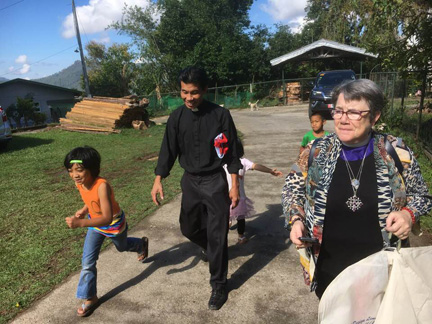
Bishop Bruce arrives at St. Benedict’s Church in Besao, Diocese of the Northern Philippines, during a May 2018 visit to several Anglican/Episcopal provinces in Asia. Throughout her episcopacy Bruce has strengthened the Diocese of Los Angeles’ ties with churches in Asia.
International partnerships and beyond
From being “Called to the Wall” at the U.S.-Mexico border to advocate for the undocumented, to visiting Asian churches to forge partnerships, Bruce’s ministry has deepened international relationships.
Korean Anglican Archbishop Paul Kim, in a congratulatory note to Bruce, said he “cannot forget the ten years of our shared ministries. With the mission of evangelism, we have shared the challenges and dreams of Asian churches, especially Korean churches. Bishop Bruce brought this partnership in diversity to the life of the Diocese of Los Angeles and the Episcopal Church. Thank you so much for these 10 years and I hope many more years of your episcopacy will be truly fruitful.”
The Rev. Ada Nagata, interim priest at the Church of the Transfiguration in Arcadia, accompanied Bruce on relationship-building trips with Asian Anglican churches. Bruce forged a chaplaincy program between Good Samaritan Hospital and the Korean church that aided chaplains and also benefited patients, a third of whom are Korean speakers.
“She (has) offered me the opportunity to learn about ministries in Asia and meet many faithful ministers. Most importantly, I learned from her,” Nagata said. “When I asked her why she was so enthusiastic about Asian ministry, she said she learned from her mother that “No matter what color of skin we have, we all bleed red.” Nobody is superior to others. She knew the ethnic group had been under-served and wanted to change that. She has become my trusted ally and support.”
And whenever Bruce encountered patriarchal attitudes during their travels, Nagata recalled, “she would smile about it but would find a way to point it out sooner or later. She likes to say she’s telling the truth with love. I witness courage and wit from her.”

Stephen and Diane Jardine Bruce pose on the infield at Dodger Stadium during the diocese’s annual baseball outing in 2013. Photo: Janet Kawamoto
Looking back, looking beyond
Bishop Diane and Steve spent the May 15 anniversary of their call as bishop suffragan and bishop’s spouse, respectively, “talking together about these last 10 years and about the bright future of our diocese,” she said.
There have been ups and downs.
Steve lost his church community but discovered a new one among bishop’s spouses, he said. He has forged his own path, working with Laundry Love and as a spiritual director and mentor. He serves on the program design team of Emmaus Spiritual Ministries of the Sisters of St. Joseph in Orange.
The week Diane was nominated for bishop she was diagnosed with bilateral breast cancer. She underwent surgery two days after her return from a long-awaited 2-1/2-week sabbatical in England and Scotland. One week later, she flew to Evanston, Illinois, to finish doctoral coursework at Seabury Western Seminary. Bald from cancer treatment, she wore a scarf during bishop candidate interviews and when she was elected Dec. 4, 2009 on the third ballot, “nobody was more surprised than me,” she said.
Burns from her radiation treatments disappeared miraculously that day. “The doctors had never seen that happen before,” she recalled. “But I believe it was all the love and prayers I got that day. It set the tone for what I was going to do for my ministry.” Today she is 10 years cancer-free and, since Dec. 31, anti-cancer-medication-free.
A native of Pequannock, New Jersey, Bruce received a bachelor’s degree in linguistics from UC Berkeley, studying Spanish, French, German, Japanese, Cantonese and Mandarin. After a career in banking, she graduated from Bloy House and was ordained to the diaconate on June 7, 1997 and to the priesthood on January 17, 1998.
Before her election as bishop, she served as associate rector at the Church of the Messiah in Santa Ana for three years and as rector of St. Clement by-the-Sea in San Clemente for nine years.
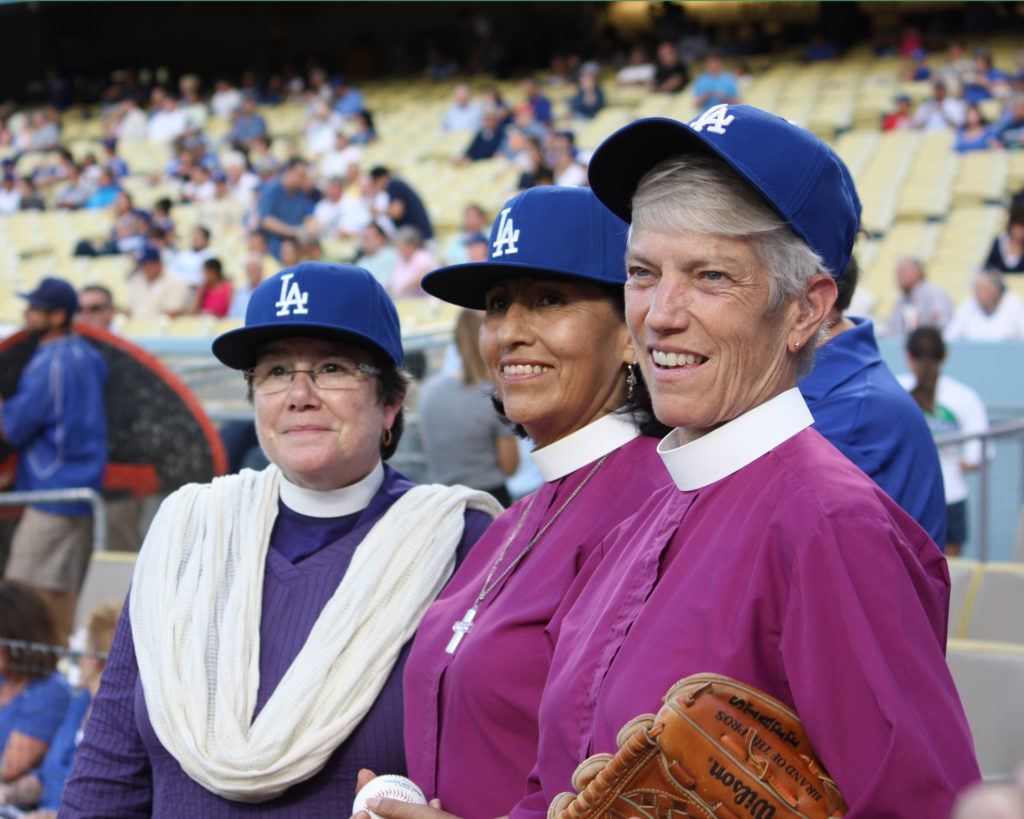
Bishop Bruce, Bishop Griselda Delgado del Carpio of the Diocese of Cuba and then-Bishop Suffragan Mary Glasspool enjoy a moment on the infield at Episcopal Night at Dodger Stadium in 2013. A few minutes later Delgado threw the ceremonial first pitch more or less into Glasspool’s waiting hands as Bruce called a strike. Photo: Janet Kawamoto
In the midst of the COVID-19 pandemic and stay-at-home orders, she returns to relationships and stewardship.
The virus has propelled the church into a period of reformation, she said. She believes the church will emerge on the other side, reformed and strengthened, incorporating both traditional and emerging ministry.
As online attendance has swelled, the question is, “How do we keep up those relationships and how do we welcome our online visitors who have been coming to us with regularity?” she said. “How do we welcome and incorporate them into this body?”
For answers, she invites the diocesan community to a June 6 online workshop, “Stewardship in the Time of Pandemic,” from 10 a.m. to 12 p.m. A second workshop, “Passing the Plate Online: Quick, Quick; Where Do I Click?” will be held from 1 p.m. to 3 p.m. the same day, she said.
“It is all about relationships,” she said, “and I think that when we come out of this we’ll realize it always was supposed to be about relationships.”
